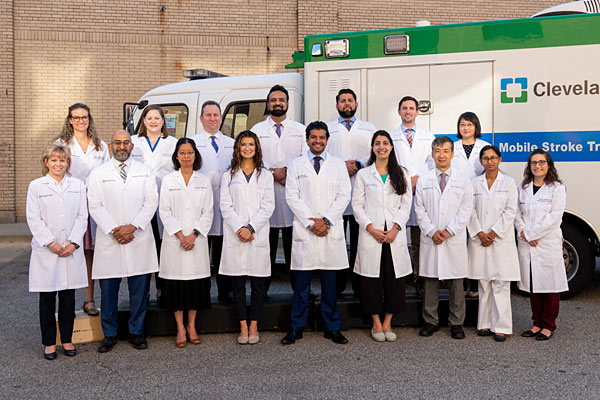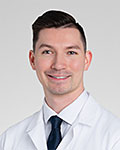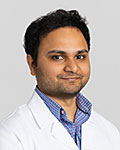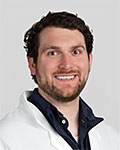Overview

Cleveland Clinic offers four fellowship positions in Vascular Neurology for a one-year ACGME-certified training program, with an option for an additional one year focused on clinical research. Eligible candidates must have completed prior neurology residency training per ACGME guidelines. Our fellowship provides trainees with a comprehensive educational experience in the management of all aspects of cerebrovascular disease. We train our graduates to be leaders in the field of vascular neurology through a broad clinical and educational experience paired with cutting edge clinical research opportunities. Uniquely, Cleveland Clinic fosters fellows to function within the disease-focused Cerebrovascular Center, working closely with faculty from neurology, neurosurgery and neuroradiological backgrounds.
Patients from all around the world choose Cleveland Clinic for their care and therefore we see a wide range of complex stroke presentations. Fellows in our program receive robust clinical training in acute stroke care while providing front-line acute stroke care through mobile stroke unit, telestroke, and emergency room care of patients presenting with a wide range of acute stroke presentations. Having the benefit of training in a disease-centered institutional model allows our fellows to work collaboratively with neuro-intensive care, neuro-surgical and neuro-interventional teams and take part in the care of stroke patients not only on the in-patient floors and step-down units but also while in the neuro-intensive care unit. Fellows also rotate on neurointerventional, neuro-sonology, rehabilitation, outpatient clinic and research rotations. Our program also offers a unique world class experience and training in inflammatory and non-inflammatory cerebral vasculopathies through dedicated subspecialty clinics in cerebral vasculitis, moyamoya disease and other complex arteriopathies where patients are cared for using an interdisciplinary approach.
While our fellowship is heavily clinically based, we believe in creating well rounded leaders in clinical stroke care, clinical research and education. For this purpose, our curriculum is formulated in a way that provides continuous mentorship to our fellows along with the research skills and dedicated time needed to be successful in their research goals. Our fellows annually present at national and international conferences, have published in peer-reviewed journals and are an active part of clinical trials research at the Cleveland Clinic. Moreover, our fellows interact heavily and closely with residents and medical students and are trained to be great educators who are well prepared for an independent career in whatever setting they choose to practice thereafter. We take pride in training leaders in the field who have gone into various clinical, academic, administrative and research settings upon completion of fellowship.
Our Team
Fellows work with a dedicated multidisciplinary team of specialists, including:
- All academic vascular neurologists, as well as neuro-interventionalists, neurointensivists and vascular neurosurgeons in the Cerebrovascular Center.
- Advanced practice providers.
- Clinical pharmacy specialists.
- Residents from multiple subspecialties (neurology, neurosurgery and emergency medicine).
- Team of research coordinators.
- Interdisciplinary Teams.
Application Process
Application requirements for the Vascular Neurology Fellowship include:
- Applications are accepted through ERAS and our program participates in the NRMP match.
- Completion of postgraduate residency in neurology is required.
- Graduates of programs outside the United States must have a valid ECFMG certificate.
- Applicants should qualify for an unrestricted Ohio medical license.
- Completion of the Cleveland Clinic Residency/Fellowship application along with the following documentation:
- Personal statement of interest.
- Curriculum vitae.
- Transcripts.
- Letter from residency program director.
- Minimum two letters or recommendation from clinical supervising physicians.
- Certificate(s) of previous training.
- Medical School Diploma.
- Certified copy of current ECFMG certificate and qualifying exam.
You may also contact the Graduate Medical Education Office for information on salary and benefits, visa process, housing and policies and procedures governing the program at 216.444.5690.
Program Structure & Curriculum
Acute Stroke Emergency Response Team (ASERT)
During this rotation, fellows provide day time (8 a.m. -5 p.m.) telestroke service for all the Cleveland Clinic Enterprise locations (14 total) under the supervision of an acute stroke attending. Fellows also cover MSU while on the ASERT rotation and sometimes while on night call (8 a.m. – 8 p.m. only). This experience helps solidify training in telemedicine services and stroke care systems of care, which is a skill we believe future leaders in vascular neurology must have. Telestroke coverage includes three thrombectomy capable stroke centers in Northeast Ohio.
Mobile stroke unit
One of the first Mobile Stroke Treatment Units in the country and the only one in Northeast Ohio, Cleveland Clinic MSU brings advanced hemorrhagic and ischemic stroke care to patients to shorten the time between the onset of stroke-like symptoms and the delivery of thrombolytics and mechanical thrombectomy to eligible ischemic stroke patients and timely transfer to appropriate stroke care centers. We train our fellows to serve as pivotal members of the MSU team and provide telemedicine services to MSU patients under the supervision of cerebrovascular staff physicians. Fellows cover MSU while on the ASERT rotation and sometimes while on night call (8 a.m. – 8 p.m. only). Fellows also get to travel with the MSTU crew during their rotation.
Inpatient stroke service
The inpatient stroke service is an integral platform for world-class education and training where fellows build upon their patient management skills while seeing a wide range of complex vascular neurological presentations and serve as team leaders, educators and patient advocates. Throughout the year, as fellows get to master their clinical management and decision-making skills on this rotation, they longitudinally build on their role as team leaders & educators.
Outpatient clinics
Outpatient longitudinal clinics occur every Monday afternoon other than when on ASERT or inpatient stroke service blocks. Additionally, fellows rotate twice a month in the cerebral vasculopathy clinic where they gain exposure to complex cerebral arteriopathies, both inflammatory e.g. primary and secondary cerebral vasculitides, cerebral amyloid angiopathy-related inflammation, etc. and complex non-inflammatory arteriopathies e.g. moyamoya disease, accelerated atherosclerosis, arteriopathies associated with rheumatological conditions, etc. Referrals for moyamoya disease, PFO closure, pre-operative optimization prior to complex cardiac surgery, COVID-related stroke, and complex arterial and venous thrombosis are some additional areas in which fellows gain exposure beyond common cerebrovascular referrals. Fellows can electively rotate in the endovascular neurosurgery clinic also. Additionally, our fellows are exposed to a wide range of patient populations, both young and elderly, all of which allows for world-class exposure to outpatient cerebrovascular presentations.
Neuro-ICU
Our fellows rotate for one month in the neurocritical care unit which is a 24-bed unit that is co-managed by neurocritical care and cerebrovascular teams. They gain wide exposure to acute stroke critical care for both ischemic and hemorrhagic stroke.
Neuro-interventional rotation
Fellows rotate with the endovascular neurosurgical radiology (ESNR) team for one month and serve as rotating fellows where they gain exposure to endovascular neurosurgical procedures and work closely with the ESNR fellows. Additional elective time can be spent if desired.
Neuro-sonology
Neurosonology is a major strength of the Cleveland Clinic Vascular Neurology Fellowship owing to our world-class educators in neurosonology in addition to designated neurosonology rotations, twice weekly ultrasound reading sessions and monthly didactic lectures which are part of the neurosonology course. Fellows also receive ultrasound and are supported to take the neurosonology certification exam by the American Society of Neuroimaging in January during fellowship year.
Rehabilitation rotation
Fellows rotate at Avon Hospital for their rehabilitation rotation where they gain exposure to the management of post-stroke rehabilitation for two weeks during their fellowship.
Clinical research
Research is an integral part of our fellowship program. Our fellows not only serve as co-investigators on the multiple clinical trials throughout the cerebrovascular center but also have three dedicated research months during their fellowship to work on specific projects under the supervision of faculty members. Research projects tailored to individual fellow’s areas of interest are identified early in the fellowship as part of the research development track and progress is tracked throughout the year. Our fellows publish several world-class manuscripts during their training along with our stroke faculty, present at national and international meetings and take part in the CV center-wide bimonthly research meetings throughout the year. Our program is also part of the Stroke Net Research network and allows funding for an additional research year if desired.
Neurology Boards Prep
In attempt to give fellows ample time to prepare for neurology board exams, our fellowship program is structured in such a way that provides our fellows with a lighter clinical call schedule and more elective time in the first quarter of their fellowship. This allows them to be well prepared for their neurology board exam and be successful.
Subspecialty clinics
Cerebral Vasculitis/Vasculopathy Clinic, Endovascular Neurosurgery Clinic, Health Differences Clinic.
Meetings & conferences
- Weekly Cerebrovascular Conference – every Friday.
- Vasculopathy Conference: Quarterly interdisciplinary conference with rheumatology.
- Neurology Grand Rounds: Tuesdays at noon.
- Weekly Inpatient Stroke Team Teaching Conference – every Monday.
- CV Center Research Meeting – twice monthly.
- Cleveland Clinic Cerebrovascular Innovations Conference – Yearly in June.
- Annual Practice Management of Stroke Conference – Yearly in Fall.
- Quality Improvement Conference.
- Cleveland Clinic CME Conferences (http://www.clevelandclinicmeded.com/live/).
Education
- Vascular Neurology Didactic Lecture Series (Every 2nd & 4th Tuesday).
- Journal Club ( Every 3rd Wednesday of the month).
- Complex Case Conference (monthly).
- Neurosonology Course (fall/spring).
Clinical Fellows
Outstanding patient care, education of those who serve and research are the three goals the Department of Neurology strives to achieve. As a part of that overall commitment to education, below are the recognized current neurology fellows who value the importance of providing the highest quality of medical care.
2025–2026 Clinical Fellows

Benjamin Coors, MD
Medical Education: Western Michigan University Homer Stryker M.D. School of Medicine, Kalamazoo, MI
Residency: Cleveland Clinic - Neurology

Nithin Kurra, MD
Medical Education: Siddhartha Medical College, NTR University of Health Science, Vijayawada, India
Residency: University of Nebraska Medical Center

Gul Sedat, MD
Medical school: Kocaeli Univ Tip Fak, Kocaeli, Turkey
Residency: State University of New York Upstate Medical University - Neurology

Stephen Trudeau, MD
Medical Education: Case Western Reserve University School of Medicine
Residency: Beth Israel Deaconess Medical Center - Neurology
Alumni Testimonials
“An outstanding program that is well-rounded and has a perfect balance of emergent, in-patient, and out-patient cerebrovascular training supplemented by Mobile Stroke, Tele-stroke, Neurosonography training and research opportunities that are imbibed into the fellowship. The faculty comprises a very knowledgeable and experienced lot yet being the most humble and supportive group, I have ever seen. It was an honor to train at the Cleveland Clinic Vascular Neurology program!”
Dinesh Jillella MD (Graduated 2019)
Assistant Professor of Neurology,
Divisions of Vascular Neurology and Hospital Neurology
"A very comprehensive fellowship encompassing the entire continuum of stroke care: prehospital evaluation (mobile stroke), hyperacute-acute stroke care (ED, telestroke, inpatient stroke codes), acute to subacute stroke care (inpatient management of complex vascular neurology), and post-acute to long term care (fellow clinic + several subspecialty vascular neurology clinics). The program balances clinical responsibilities well with ample educational, quality improvement, research, and mentorship opportunities. Aside from being trained by and working with leaders in the field, it was an extremely supportive, collegial, and collaborative environment. I felt more than prepared to start my career as a vascular neurologist as a direct result of my fellowship training. I couldn’t be happier to still be a part of this fellowship that gave me so much."
A. Blake Buletko, MD
Staff, Vascular and General Neurology
Program Director, Neurology Residency Program
Assistant Professor of Neurology, Cleveland Clinic Lerner College of Medicine of Case Western Reserve University
Program Leadership
Program Director
Ken Uchino, MD
Associate Program Director
Jonathan Solomonow, MD
Program Coordinator
Frank Miller Jr., MS, C-TAGME
Living in Cleveland
Cleveland, a vibrant, mid-sized city located on Lake Erie, features a host of cultural attractions, recreational activities, major sporting events and an exploding culinary scene. Cleveland is home to the second largest theater district in the U.S., a park system featuring 23,700 acres in 18 reservations, and is the birthplace of rock ’n’ roll, home to the Rock ‘n’ Roll Hall of Fame and Museum. Cleveland Clinic is located near the University Circle area, which is the cultural epicenter of Cleveland. This area features Severance Hall and the world-renowned Cleveland Orchestra, the Cleveland Museum of Art, several other museums, and Case Western Reserve University. Downtown Cleveland, home to all major sports venues and an exploding culinary scene, is approximately two miles from Cleveland Clinic’s main campus.